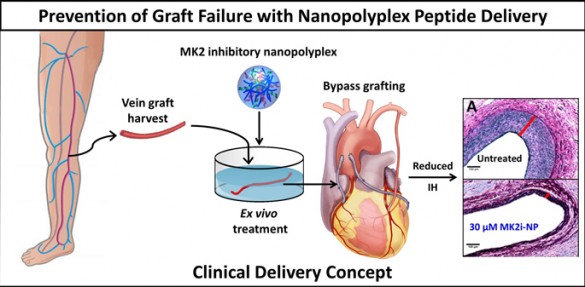
Illustration shows “nanopolyplex” delivery of a peptide into a surface leg vein prior to bypass grafting. The peptide inhibits a signaling pathway that drives proliferation of cells in the inner lining of the blood vessel, a process known as intimal hyperplasia (IH). As shown at right, the treated vessel has less thickening and is less likely to become obstructed.
A team of Vanderbilt University Medical Center surgeons and biomedical engineers has developed a nanoparticle delivery system that may significantly improve the success rate of coronary artery bypass grafts.
Currently nearly half of all saphenous vein grafts (a superficial leg vein used to bypass blocked coronary arteries) fail within 18 months because of inflammation and intimal hyperplasia, inward growth of cells in the vessel’s inner lining that can block blood flow to the heart.
This process is driven by signaling pathway involving the protein MK2. A highly specific, cell-penetrating peptide-based MK2 inhibitor is in clinical trials in Europe but its effectiveness is limited because it gets trapped in endosomes and lysosomes in the cell, where it is degraded.

Colleen Brophy, M.D., and Brian Evans, Ph.D., seated, Craig Duvall, Ph.D., standing at left, and Kyle Hocking, Ph.D.), led the research team that developed a nanoparticle delivery system to improve the success rate of coronary artery bypass grafts. (photo by Anne Rayner)
Colleen Brophy, M.D., professor of Surgery, Craig Duvall, Ph.D., assistant professor of Biomedical Engineering, and their colleagues developed electrostatically complexed nanoparticles that can efficiently deliver the peptide inhibitor to vascular cells while avoiding endosomal and lysosomal degradation.
In a report published last week in Science Translational Medicine, they showed that nanoparticle delivery of the peptide in laboratory studies and an animal model significantly inhibited intimal hyperplasia and continued to be effective nearly two months after it was administered, while delivery of the peptide alone had little effect.
“It’s a one-time delivery to the tissue during transplant so it’s safe and limits the patient’s exposure to the drug,” Brophy said. “Importantly, after this single treatment, the nanoparticle drug has a half-life of 55 days.”
The peptide “is a very promising drug,” she added. “We’re just trying to make it better by making it more potent and more durable in action so that the graft is protected while it is recovering from the transplant procedure.”
Further testing is necessary before nanoparticle delivery can be tried in humans. But the approach may be useful for treating a wide range of disorders, including pathological vasoconstriction.
Last month in the American Chemical Society journal ACS Nano, Brophy, Duvall and their colleagues reported that nanoparticle delivery of vasoactive peptides to isolated human vascular tissue prevented vasospasm, which can limit blood flow to the heart following coronary artery bypass.
Vasospasm can also occur in the brain following a bleeding stroke, and causes nearly half of all stroke-related deaths.
Both studies were led by first and second authors Brian Evans and Kyle Hocking, who earned their doctorates in Biomedical Engineering at Vanderbilt this year.
Their different skill sets “allowed us to cover a lot of ground and enabled us to do basic nanoscience and technology development toward a real clinical problem with no current solution,” Duvall said.
The work was supported by the American Heart Association, a National Science Foundation Graduate Research fellowship to Evans, and a four-year exploratory/developmental research grant (HL110056) to Duvall from the National Institutes of Health.
Some of the experiments were conducted at the Vanderbilt Institute of Nanoscale Science and Engineering (VINSE). A patent application was filed by the Vanderbilt Center for Technology Transfer (CTTC), and the technology has been licensed to Moerae Matrix Inc. Brophy is the company’s chief medical officer and a stockholder.
Contact:
Bill Snyder, (615) 322-4747
william.snyder@Vanderbilt.Edu